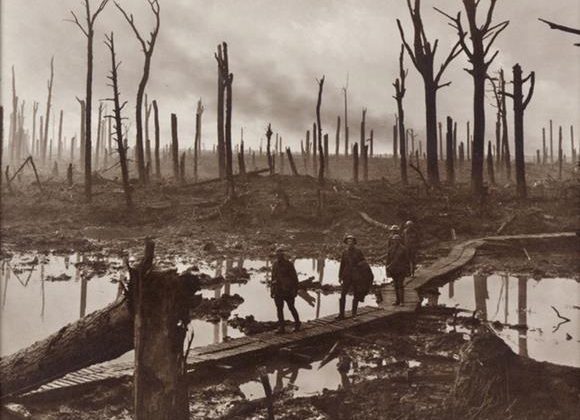The 11th November, as everyone knows, marks the end of the First World War, but it was also the culmination of the ‘Hundred Days Offensive’ as it has come to be known. This was the final Allied push, countering the gains made by the German Army in their summer offensive of 1918.
The Offensive began with the Battle of Amiens in August and continued through to the 11th hour in November. It was incredibly costly; amongst infantry and cavalry alone, estimates of Commonwealth casualties reach nearly 300,000 between the 7th August and the morning after the Armistice. Even greater numbers of casualties were suffered by the French and German armies.
One of the final battles of the war was the Battle of the Sambre, commencing on the 4th November. The Sambre River runs through Namur and Charleroi in Belgium, and through Maubeuge, the Foret de Mormal and not far from Le Cateau-Cambresis in France. The 1st Battalion of the Duke of Cornwall’s Light Infantry was with 95th Brigade in the 5th Division. On the morning of the 5th November the 95th joined in pursuit of the withdrawing German Army.
Ultimately, their experience characterised much of what was experienced elsewhere; a German Army in chaos, as they chased its ghosts beating their retreat across France and Belgium. A moment of introspection however was found in the British advance, as officers and men of the 5th Division crossed the battle lines they had fought along in the August of 1914, just over 4 years ago.
There were not, of course, many officers or men of the original Division left, but to those who had weathered the storm of those four terrible years, the sight of the Roman Road once more, and the Foret de Mormal, be it in darkness and all the dismal aspects of winter, was a moving thing.
Here they were pursued much in the same way as they were doing now; just as the German Army had chased them away to the Marne; now they chased those same forces to the Rhine.
1 DCLI saw little contact in these last days, perhaps to their great relief. On the 10th, the 5th Division ended its part in the war, being ordered to hold its positions. 1 DCLI withdrew to Le Quesnoy, where on the morning of the 11th they received the news; the war was over. The message received by all read:
Hostilities will cease at 11.00 hours to-day, 11th November. Troops will stand fast on line reached at that hour which will be reported by wire to Corps Headquarters…
There was no celebration, just a collective relief that now, over four years later, the Great War was over. Not one in a hundred battalion, brigade or divisional diaries, even mentions cheering.
The Duke of Cornwall’s Light Infantry War Diary entry from the 11th reads:
Bright but cold. Battalion left LA PORQUERIE at 07.00 hours and marched to LE QUESNOY. On arrival there, were informed that an armistice had been signed to take effect at 11.00 hours today. Battalion in comfortable billets at the barracks.

